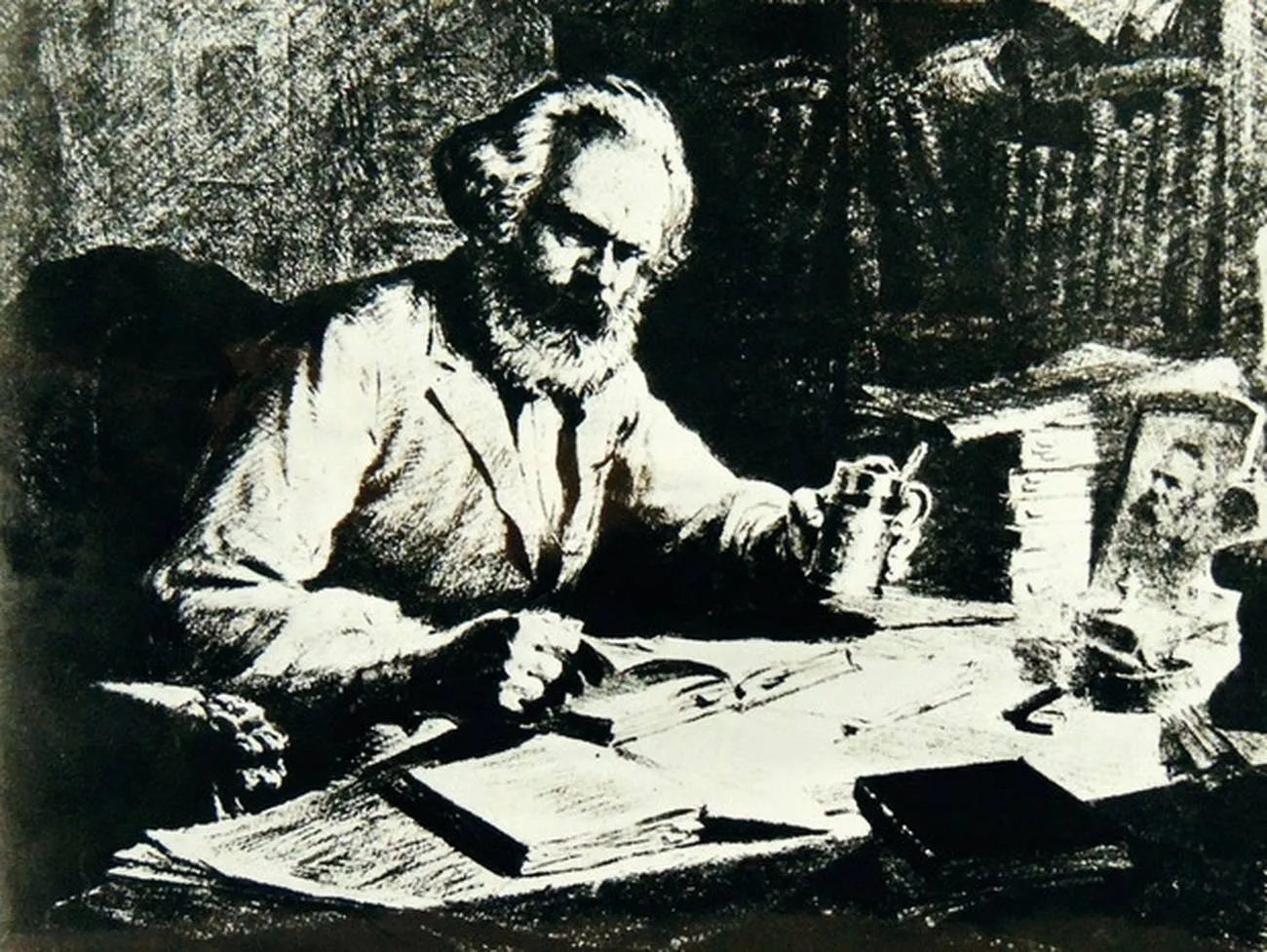
Arthur Blok - who doesn't know him? - invited me to write an article for his platform, The Liberum. "You can say whatever you want, there are no rules, you can be a scoundrel if you want," was his concise and to-the-point invitation.
By Sid Lukkassen
I know myself and how my energy system works these days: I have to start something immediately, as soon as I feel the spark or energy of an idea, otherwise it will be postponed and never come to fruition.
This stems from two factors: first, the ingratitude of the Netherlands and specifically Dutch institutions. A realisation, a process, that drains my spiritual strength enormously. Secondly, the South American climate. It rains a lot, but it's also incredibly hot with plenty of sunshine. Everything is constantly growing and proliferating, which means everything requires a tremendous amount of maintenance.
This last point brings me to the fact that I will be dealing with Marx's labour theory of value.
And as I write this, I'm interrupted by a handyman who has to come and install an air conditioner because another handyman didn't do a good job. I should really bring my own family. Lukkassen was once the name of a large construction company, because at least they know their stuff.
I come from a family of construction workers and handymen. And the shoddy work these guys do here is unbelievable in comparison. This brings us back to the Netherlands: a few months ago, I visited a Human Resources Manager in the Zuidas district of Amsterdam.
He had a balcony door that wouldn't stay closed. And it took three weeks before a handyperson could come and take a look. Great, you're among the elite, and that's still your fate. This is only going to get worse.
Anyway, I just read a text about Karl Marx, the founding father of socialism, and therefore also about "labour power." British political economists, such as David Ricardo and Adam Smith, made no distinction between "labour" and "labour power," and this is why their conclusions were confused, Marx argues.
Labour is then elevated to something glorious, something creative: a unique capacity to add wealth to the world, to leave the world fuller and more beautiful than you found it. All of socialism, then, boils down to an emancipation of that power, developing into a pure and unadulterated form that lies beyond capitalism.
For Marx, capitalism is the "Jewish wheeling and dealing" and a destructive urge for accumulation. which he describes as “commodity fetishism.” Marx says this literally in ‘On the Jewish Question’ (1844).
The article also discusses Marx's philosophical emancipation. He earned his doctorate and was on the verge of becoming a full-time academic, but then political developments led him down a different path.
He became a newspaper editor and immersed himself in the field of economics. Georg Hegel was an armchair philosopher who posited that the spirit of history attained a form of self-awareness, ultimately leading to the establishment of the rule of law.
Marx, however, felt this was a disservice to philosophy: an actual realisation of concepts requires a broader perspective. After all, the working class still lived in poverty, and wealthy capitalists exploited most people.
Therefore, the emancipation of philosophy required emancipation beyond abstract concepts and ideas. Philosophy had to become flesh, as it were, and bring about a political-economic development: the emancipation of the working class, the downfall of capitalism, the realisation of the communist utopia, and the workers' paradise. All of this was summarised in the credo: "Philosophers have only interpreted the world – the point is to change it."
Now we return to my experience with those handymen. And every minute I spend writing about this means I have to rest for an hour afterwards. That's how frustrating this process is. It's incredibly disappointing to have to rediscover this piece mentally for Arthur. As my friend Vinood said, "A year from now, we'll look back on this and laugh about it." I hope so.
It started with a cleaning lady arriving at noon, followed by someone checking the pool at 2 pm and someone replacing the air conditioning at 4 pm. And the latter said, "I'm on my way, sir! I'm stuck in traffic." He kept repeating this until he finally arrived at 8 pm. Then all the air conditioning work still had to be done.
He couldn't quite manage it: I was left with a hole in the wall that I patched up myself a little later. And he needed pipes he hadn't brought with him. There was also welding going on in the middle of the living room, with nothing under it. And so on.
Finally, the team cleared out around eleven o'clock at night, and I still had to eat. Because I had nothing in the fridge, having landed by plane the day before, and because I'd been waiting all day for handymen. So I had to scour the entire city in the middle of the night to find something to eat.
I can also give the example of one day getting an urgent call: "Sid!! They're going to turn off the water!!" So I rushed to the store to pay the bills. This was because the tenant, contrary to the agreement, hadn't paid the bills. Well, just try enforcing that with someone now living somewhere in the deep south of the US...
The next morning, I thought, "I wish the water had been turned off," because the pool guy had left a faucet open, which apparently kept running while I'd turned off the pool pump. And because of this, my yard had turned into a swamp: the water was literally coming up from the ground.
My energy is drained into a leaky sink from constantly being in contact with handymen who fill the holes left by other handymen. And I haven't even mentioned the carpenter: he had to make a wooden hatch to replace the super-heavy, completely impractical cover that currently protects the pool motor from mud and rain. But there was a massive gap between the hinges of his creation, allowing all the water to flow into the motor. "I'll come fix this after the weekend," the carpenter said.
However, due to the swamp story, the wood of the hatch had saturated entirely with water, causing it to expand and making it impossible to open. To pump out the water, I had to lift the entire structure, and then several screws broke, revealing the rickety nature of the structure. It was only a day and a half old. I felt ripped off. So, I decided to hire local craftsmen, and the result is subpar work.
I understand the people who settled in the German colonies much better now. Incredibly remote and far away. However, at least there are standards of quality and craftsmanship in place. You're working with half-monkeys, from whom you remain shielded as long as you use Airbnbs.
Local craftsmen don't think along with you, and they also don't understand the long-term consequences. For example, I had to explain to the carpenter that rainwater would pour in through that crack (even though I'd previously stated that the construction had to be waterproof).
That the rainwater would still drip onto the engine, that it couldn't evaporate in the sealed engine compartment, that it would mix with the mud on the ground and rot in the heat.
In short, when you talk about "philosophy that must become practice," it turns out that Marx is entirely wrong. Labour isn't some incredible force that creates beautiful things on its own. The factor of "entrepreneurship" is incredibly important. You really have to drill a monkey like that: you have to sit on top of them to get them to do their job with any real purpose or effectiveness.
They'll easily spend four hours stuck in traffic, only to arrive at work and discover they need to move a pipe, but don't have the pipe with them. As a result, they end up improvising something that's incredibly ugly and even damages the house in the long run.
Although I'm an academic, I understand basic things better than local "craftsmen." I used to hold craftsmen in high regard—also because of my background: what could be more beautiful than someone who creates something, accomplishes something, using their own strength? And, for example, creates a bathroom that will provide the user with value for decades to come.
But that's not the reality at all. They drill a hole in a wall and leave it as it is. They have their money and won't return for a neat finish, which diminishes the aesthetic value of the home. And so on. This is in direct contrast to Marx's idea that labour only adds value.
I, with my European brain, apparently add a value to their labour that they don't inherently possess. They can't think ahead. For example, a garden floods if you leave a tap open. That wood expands when it gets wet. Yet that's their profession.
"Philosophy that must become practice" thus proves that practice shows that all sorts of other factors are far more critical than that much-vaunted "labour power." For example, the superior cognition of a European brain and the factor of "entrepreneurship." Most local handymen appear incapable of thinking beyond the next twenty minutes.
Now I also understand much better the urge to surround yourself with people on the same level, which is why Germans, for example, gravitate towards other Germans. Then, you have certain expectations that labour must meet. As soon as you're in a multicultural context, that spectrum of expectations explodes.
So there's something else Marx failed to consider in his analysis of labour as the ultimate engine of emancipation: cultural homogeneity.
There are indeed examples of how the local population has been made productive. However, this is primarily when they serve as helpers for Mennonites of German descent. So in that case, you have a European Leitkultur to which the local workforce is then made subservient.
Likely to beAnyway, may this article shed much light and bring light to the world. And many people are likely to be offended, just as Arthur had hoped. But what are you going to do? – I am in South America.
You can support me: Sid Lukkassen.
Sincerely,
Dr. Sid
Sid Lukassen is a Dutch political philosopher and author. He actively participates in public debate, including through his books such as "Avondland en Identity" (Evening Land and Identity) and his razor-sharp analyses and opinion pieces. Lukassen was a policy officer at the European Parliament and made a documentary about the elected mayor. He comes from a family of no-nonsense, middle-class, and hardworking blue-collar workers, and writes to unite people and their country.





[…] party composed of former radical-lefties and the far-right party of Geert Wilders (PVV).By Sid LukkassenThis leaves few options for forming a government. All of this is happening because the VVD […]